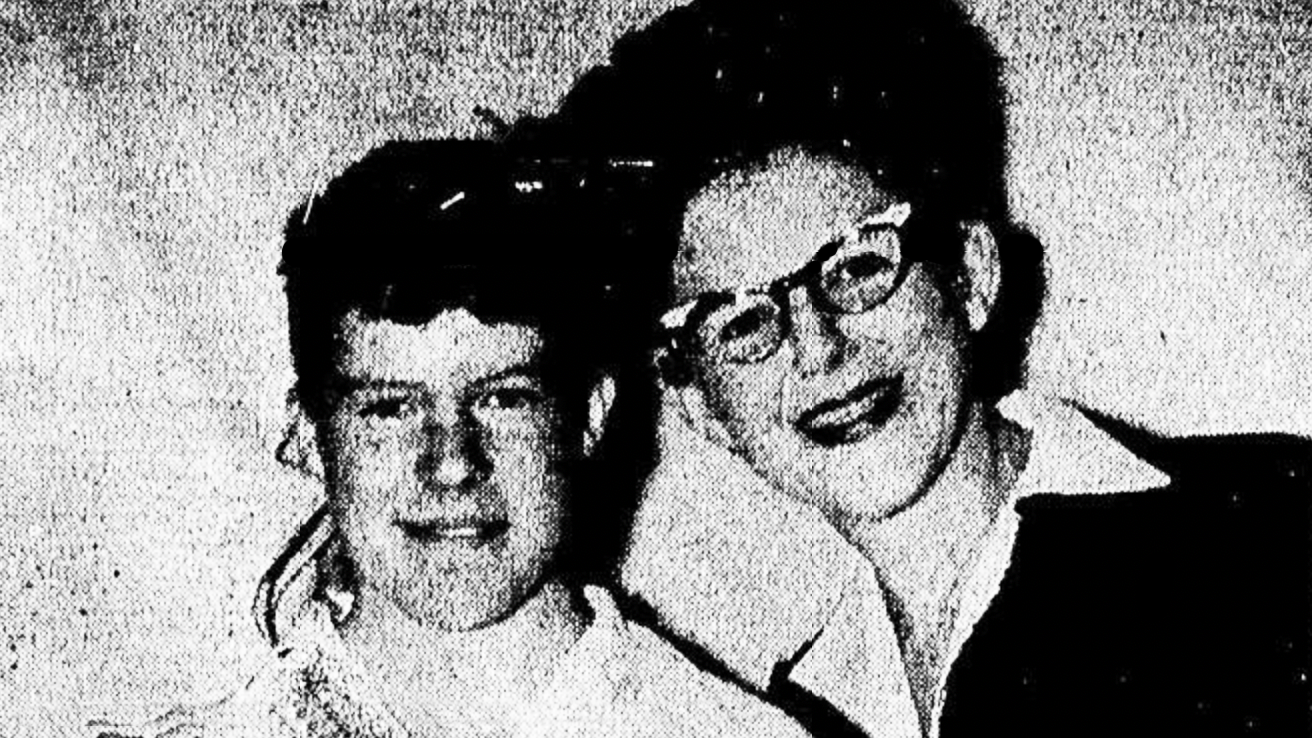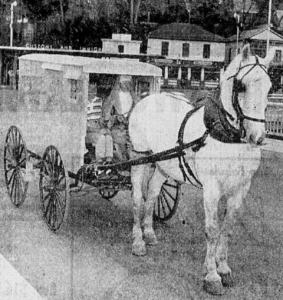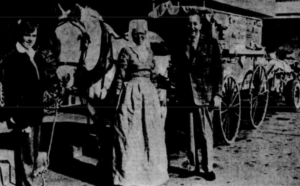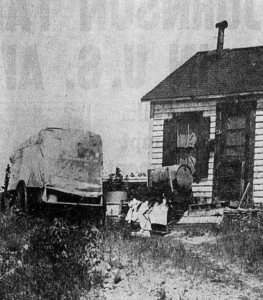On July 24, 1959, a 50-something widow from Shediac set off on the journey of a lifetime. Her mission: to meet Walt Disney and share with him a secret she believed would somehow pay for her daughter’s university education. Her means: a wagon pulled by a retired milk horse named Bob.
Matt Carter

This is a story of Vivian Larsen.
Vivian Cecilia Larsen was born and raised in Shediac, New Brunswick, where she worked for many years at the Shediac Hotel. Beginning in the late nineteen thirties, Shediac’s Pointe du Chene wharf served as a fuel stop for Pan-American flights between the United States and England. Flying boats – enormous passenger planes carrying more than a hundred guests and designed to land on water – stopped in Shediac three times a week during their transcontinental journeys. On many occasions, unfavourable weather conditions required passengers to stay overnight. A long list of celebrity guests that includes Bob Hope, Betty Grable, and Queen Wilhelmina of the Netherlands all stayed at the Shediac Hotel during this time. By the time Larsen reached her mid-fifties she was unemployed, widowed, and the mother of two daughters, Barbara and Sandra. Described by her friends as beautiful, strong-willed, and possessing admirable artistic talent, Larsen seemed, by all accounts, an average New Brunswicker living an average New Brunswick life. But that all changed in July of 1959 when she announced her intention to travel to Hollywood to share what she considered to be a valuable secret with Walt Disney.
At the time of her announcement, Disney and his film and animation studios were at the height of their early popularity. His animated productions of Snow White and the Seven Dwarfs, Pinocchio, Fantasia, Dumbo, Bambi, and Peter Pan had already captured the world’s attention and redefined the entire film entertainment industry. And in January of 1959, Disney introduced the world to Sleeping Beauty, further securing his position as one of the most powerful and influential men in Hollywood. As a result of his popularity, Disney was an incredibly busy man and definitely not the type of person anyone could hope to casually approach seeking conversation. But Larsen was determined to meet him and share what she believed to be a valuable secret, one that was worth traveling some 4000 miles by horse and wagon to deliver.

On July 24, 1959, Larsen, her teenage daughter Sandra, and a retired milk delivery horse named Bob left Moncton to begin a journey they estimated would last five months. Dressed in a homemade outfit resembling a nun’s habit – one of three made for the journey – Larsen quickly came to realize her adventure may take longer than she originally thought. Averaging just 20 km a day, it took the trio two weeks to reach the border town of St. Stephen where Bob required his first set of new shoes and had to undergo a medical checkup before crossing into the United States.
From her departure onward, Larsen’s journey was well documented in the local papers with frequent updates featured throughout her entire trip. In each community through which she passed, reporters sought the opportunity to speak with her and learn the details of her motivation. Though she remained tight-lipped about her secret, readers were treated to regular updates involving accommodations, food stocks and Bob’s health. While most articles revolved around a shared fascination with her motives, others attempted to belittle Larsen attacking both her credibility as a free spirit, a parent, and a woman. A Canadian Press article from July 27, 1959 claimed Larsen had committed to a vow of silence prior to her departure, though there are no direct quotes to back this claim and such an undertaking would have no doubt made the trip seem even longer for her shotgun riding teenage daughter. The article, Breaks Vow of Silence, began with the sentence, “Women just can’t keep their mouths shut,” and went on to detail how Larsen engaged in conversation with a family who invited them to dinner as they passed through the community of Apohaqui, about 10 km outside of Sussex. The article clearly conveys both a prevailing attitude towards independent women in the nineteen fifties and perhaps a sense of jealousy towards Larsen and her will and determination to plot her own unique path in life.
What started off as a five month journey ended up taking sixteen to complete. With Bob leisurely leading the way, Larsen and her daughter plotted a course through Maine, New Hampshire, Massachusetts, Connecticut, New York, Pennsylvania, Maryland, West Virginia, Kentucky, Tennessee, Arkansas, Texas, New Mexico, and into Arizona. The Canadian Press article, Bob’s Just Fine – But Snakes! from September 17, 1960 explained how Larsen purchased a rifle to keep Bob safe from snakes and mountain lions and was seriously considering hiring an armed escort to see them safely through the desert.

The trio finally reached California on October 29, 1960, 514 days into their journey. It would take several more weeks to reach Los Angeles where, on November 28, Larsen would at last come face to face with the mustached millionaire himself. After more than a year on the road, during which time Larsen fashioned 23 new outfits from Bob’s old feed bags, the moment she had been waiting for had finally arrived.
Unfortunately for Larsen, the meeting with Disney did not go as expected. Reports claim Disney offered Larsen and her daughter each a glass of tomato juice and asked to take a picture with Bob. Following the photo he promptly dismissed the travelers and returned to his office. Though Larsen passionately explained the reason for her trip and repeated her request for Disney’s council, she was refused any time alone with the movie mogul and told her message would only be accepted in the form of a written proposal. “I told him I had $70, was in a strange city, and had to support my daughter,” Larsen told a reporter from the Canadian Press after her ill fated meeting. “Then he said, ‘since you got out here alright, I’m quite sure you could find your way back.’ He shook hands with us and he left.
“We were led to believe Mr. Disney was a very kind person. Everybody seemed to think he was wonderful and generous and would do anything for us,” said Larsen. “We were built up to such a pitch that it was hard to take. He didn’t seem a bit like the man I expected to see. He acted very nervous, indifferent to our idea, and seemed like he wanted to get away.”
For all their efforts, the pair received less than 30 minutes of Disney’s time and had nothing to show for it besides a few glasses of tomato juice and a complimentary meal at the studio cafeteria. In the days and weeks that followed, Larsen, Sandra, Bob, and a dog named Abby who joined the band of travelers back in El Paso, became minor celebrities in the City of Angels as they rode their wagon along Sunset Boulevard meeting reporters and accepting various donations of food and lodging as they contemplated their next move. Cash and resources were tight and Larsen was approached several times with paid offers to appear on talk shows but declined each request.
Back in Moncton, plans were underway to bring the original trio home. A group set up an account at a local bank to collect donations to pay for a pair of plane tickets, while a separate fund was established to bring Bob back to Moncton by rail. At the same time, a proposal to build a transportation museum in Moncton had been submitted to city council by the Southwestern New Brunswick Tourism Board and Larsen agreed to donate her eight by three foot wagon and a number of her handmade outfits as potential exhibit items. During this time, a daily tally of donation updates ran in the Moncton Daily Times while organizers searched for other ways to help bring the travelers home. Thanks in part to a generous donation from the Canadian National Railway and funds collected from local supporters, Larsen and her daughter Sandra arrived back in the province on February 14, 1961. Bob arrived two days later. Abby the dog stayed in Los Angeles.

Shortly after their return, the Larsens faded from the public eye. Bob retired to a farm outside the city and plans for the transportation museum were shelved indefinitely. Sandra eventually finished high school and joined the navy. After failing to sell her secret idea to Disney, Larsen made attempts to seek a ghostwriter to help put her undisclosed story into words. But five years after her epic adventure came to an end, Larsen was still holding on to her secret, unable to trust it with anyone. An article in Moncton’s Evening Times Globe from July 26, 1966 noted how Larsen was still hoping to publish her story but was wary of offers for help for fear her idea would be stolen. “I’ll carry my secret to my grave if I’m unable to publish it,” she told a reporter.
Unable to find work in the years following her trip, Larsen spent the next three decades living in poverty in a dilapidated home on the outskirts of Moncton surrounded by some fifteen thousand souvenirs collected during her trip. She survived on government subsidies and what money she could make from selling homemade hats and paintings at local craft fairs. Outside her kitchen window, the pink wagon that carried her and her daughter along quiet backroads, through busy city streets, and across barren deserts, succumbed to the elements. Once imagined as a museum centerpiece and tourist attraction, it too, became weak with age and had long been forgotten.
Vivian Larsen died on January 30, 1991. Her secret died with her.
Vivian’s story features prominently in Resident Aliens, the new play from Don Hannah making its world premiere with Theatre New Brunswick in March. Tickets for performances in Fredericton, Campbellton, Moncton, St. Andrews, Florenceville-Bristol, and Sackville are on sale now.
Related:
That time Teenage Head played a pizzeria in Oromocto, sort of.
That time Alice Cooper scared the pants off Fredericton.
That time New Brunswick banned a David Lynch movie from theaters.
That time Charles LeBlanc biked 9000 miles just to see if he could do it.
That time a Fredericton indie theatre production of MacBeth won the internet.
That Time A Bathurst Police Strike Turned Main Street into a Drag Strip.
That Time Fredericton Art Galleries Came Together in Support of Nudity.
That Time Six Fredericton Businesses Decided to Take The Law Into Their Own Hands.
That Time Robert Frank’s Rolling Stones Documentary Didn’t Come to Fredericton.




